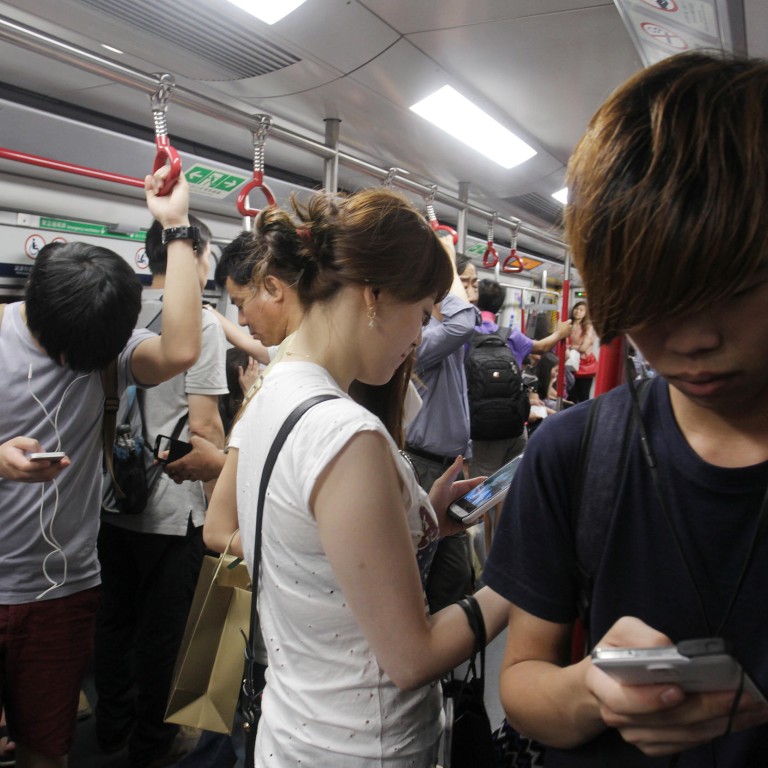
Are you addicted to your smartphone? You may need professional help...
Easily distracted? Can't be separated from your smartphone? Constantly checking your device for no reason? Chances are you're an addict.
Easily distracted? Can't be separated from your smartphone? Constantly checking your device for no real reason? Chances are you're an addict - and you may even need professional help.

Led by Singapore and Hong Kong, the Asia-Pacific region boasts some of the world's highest smartphone penetration rates, according to a 2013 report by media monitoring firm Nielsen. Some 87 per cent of Singapore's 5.4 million population own smartphones. A similar percentage of Hong Kong's population also owns smartphones.
In the United States, where there are similar concerns about the impact of smartphones on society, a 65 per cent penetration rate would not even make the top five in the Asia-Pacific region.
Singaporeans also spend on average of 38 minutes per session on Facebook, almost twice as long as Americans, according to a study by Experian, a global information services company.
Adrian Wang, a psychiatrist at the upmarket Gleneagles Medical Centre, said digital addiction should be classified as a psychiatric disorder.
"Patients come for stress anxiety-related problems, but their coping mechanism is to go online, go on to social media," Wang said.
Hottest day of the year heralds start of Hong Kong's typhoon season
He recalled having treated an 18-year-old male student with extreme symptoms. "When I saw him, he was unshaven, he had long hair, he was skinny, he hadn't showered for days, he looked like a homeless man," Wang said. The boy came to blows with his father after he tried to take away the young man's laptop computer.
After the father cut off internet access in the house, desperation drove the boy to hang around neighbours' homes trying to get a wireless connection.
He was eventually admitted to hospital, put on anti-depressants and received "a lot" of counselling, Wang said.
"We just needed to break the cycle. He got better, he was discharged from the hospital."
Tan Hwee Sim, a consultant psychiatrist at The Resilienz Mind clinic in Singapore, noted that the symptoms exhibited by her young adult patients had changed over the years.
Obsession with online gaming was the main manifestation in the past, but addiction to social media and video downloading are now the trend. In terms of physical symptoms, more people are reporting "text neck" or "iNeck" pain, according to Tan Kian Hian, a consultant in the anaesthesiology department of Singapore General Hospital.
"It is a commonly observed phenomenon that many people have their heads lowered and are now using their mobile devices constantly on the go, while queuing or even crossing the roads," Tan said about smartphone use.
Singapore's problem is not unique, with a number of countries setting up treatment centres for young internet addicts.
Mainland China already has an estimated 300 internet addiction centres, according to a report on state broadcaster CCTV's website in February. It cited a survey showing there may be more than 24 million young Chinese addicted to the internet.
In Singapore, there are two counselling centres with programmes for digital addiction.
Trisha Lin, an assistant professor in communications at the Nanyang Technological University, defined digital addiction by a number of symptoms: the inability to control craving, anxiety when separated from a smartphone, loss in productivity in studies or at work and the need to constantly check one's phone.
Lin warned that parents should avoid giving their children a smartphone or tablet computer to keep them quiet. "It's like the TV in the past with the babysitters and now it's even worse because now you have the screen with you everywhere," she said, citing the case of a Taiwanese high school student who could only sleep clutching her smartphone in case someone tried to call her.
